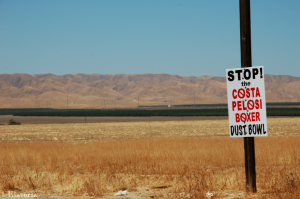While much of the country has spent the last six months dealing with unusually harsh weather and rarely seen precipitation, California has been mired in its worst drought in modern history. The state is currently drier than it has been since records began being kept over 100 years ago, with little hope of relief as winter snowpack sits at 12% of normal [i]. The U.S. Drought Monitor report estimates 95% of the state is in the Severe to Exceptional drought categories [ii] [a time lapse graphic on PolicyMic [iii] shows just how severe this drought is]. This is obviously an enormous concern for California and its residents, but should not be overlooked by the rest of the country.

Satellite images showing lack of snow cover in the Sierra Nevadas and overall aeration of California’s central farm lands.
California has the largest agricultural economy in the country, responsible for $44.7 billion in agricultural products. The drought is already having a large affect on the industry, and food prices nationwide are expected to continually creep higher as California farmers are forced to put over 500,000 acres in fallow this year [iv]. The severe drought is obviously largely at fault for the agricultural issues, but other factors also come into play.
State and federal water management plans have long been in place to oversee water allocation between the northern and southern halves of the state. Northern California has historically been relied upon to provide water for the Central Valley and its agriculturally based economy. Because of this shared reliance on a common source, water rights have been a frequent cause of debate and court cases [v]. Most recently, in 2007, a Federal Judge ruled that more water had to remain in the wetlands north of San Francisco to protect the Delta smelt, a small fish on the Endangered Species List. This caused uproar amongst farmers and communities in the south who felt as if they were being treated as less important than a fish. This feeling resurfaced just last month as the 9th U.S. Circuit Court of Appeals overturned a prior ruling, keeping the original policy intact to protect the Delta smelt [vi]. As the drought continues to worsen and farmers are unable to grow crops on their land, the battle between protecting a fish and a way of human life is only going to intensify.
Another contributing factor to the current drought is global climate change. History shows droughts are a natural occurrence, but many people including myself believe the severity of this particular drought is due to climate change. Extreme weather events have been intensifying around the globe over the last decade, and will likely worsen as climate change continues to impact the planet.
Because there are so many contributing factors to the issue, an integrated policy plan needs to be implemented by the California state and Federal governments. This plan needs to include immediate disaster relief such as is included in the $687 million drought relief package passed by the California government, but also long term solutions to climate change and water rights laws [vii].
The fact of the situation is that no matter how much water is pumped from Northern California into the central agriculture areas, there won’t be enough water for all the fields. The drought itself is the root of the problem as it has simply been too severe for too long. Government regulations have no doubt played a factor, but are too valuable to be thrown aside as emotions run high. Regulations protect not only the delta smelt, but also many other species of fish, as well as the Sacramento-San Joaquin Delta as a whole [viii].
Many central California farmers and residents blame the drought on more than just mother nature.
Farmers and many conservative politicians feel similarly to the above photo: that they are the victims of environmentally friendly liberals who care more about an endangered species than their livelihoods. At first, I even thought this was the case, but in fact the delta smelt being endangered likely saved the entire estuary ecosystem from being pumped dry to grow more and more crops. It is just one of the many warning signs that we must confront climate change and implement resource conservation practices before our impact on the earth becomes too large to handle. Mother nature has presented this challenge, which our actions have exacerbated. Don’t take it out on the fish to try and solve it.
[i] http://www.foxnews.com/us/2014/02/02/california-cuts-off-water-to-agencies-serving-millions-amid-drought/
[ii] http://www.nbclosangeles.com/news/local/Drought-Monitor-California-Water-Supply-Drought-254723421.html
[iii] http://www.policymic.com/articles/83535/see-just-how-bad-the-california-drought-is-in-one-alarming-image
[iv] http://www.marketwatch.com/story/california-farm-drought-crisis-deepens-2014-02-22-16103424
[v] http://www.nytimes.com/2014/02/15/us/politics/obama-to-announce-aid-for-drought-racked-california.html?_r=0
[vi] http://www.reuters.com/article/2014/03/13/us-usa-california-water-idUSBREA2C1MB20140313
[vii] http://www.reuters.com/article/2014/03/02/us-usa-drought-california-idUSBREA2010G20140302
[viii] http://articles.latimes.com/2014/mar/13/local/la-me-delta-smelt-20140314


